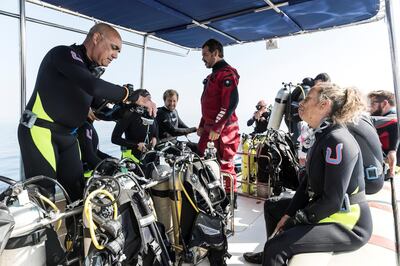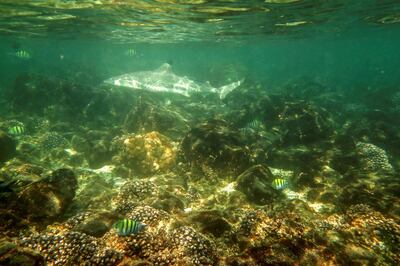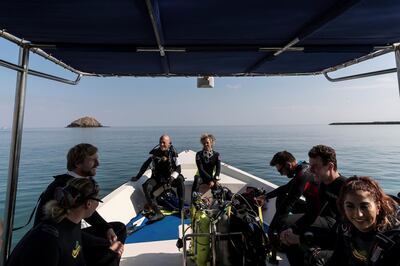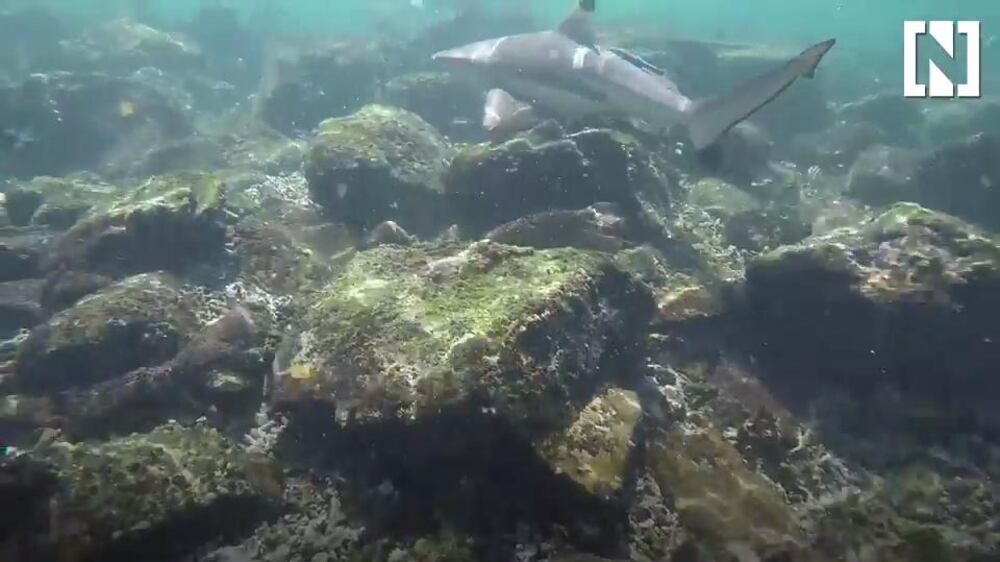At first it seems like a shadow, or a large fish swimming in the shallow waters off Dibba Rock on the east coast.
It soon becomes clear the sea is teeming with sharks, some as big as two metres in length.
That was the experience of divers taking part in shark educational workshops as part of a wider national conservation programme for vulnerable species.
Populations of black tip reef sharks have been dwindling over the past two decades due to overfishing, plastic pollution and coastal development that has destroyed segments of their natural habitat along the Gulf of Oman and Arabian Gulf.
That is beginning to change as divers discovered on the first weekend of a series of workshops hosted by the International Sharks Educational Institute.
Experts aim to educate divers to help monitor population numbers around the nation’s coast where 23 shark species are classified as endangered or critically endangered.
Fernando Reis, executive director of the non-profit Sharks Educational Institute, said lessons are a good opportunity to learn how to deal with shark interactions.
“During the four dives in Dibba there was a total of 25 sightings of black tip reef sharks,” he said.
“Dive centre instructors said they have seen as many as ten sharks at the same time.
“This suggests populations are improving and there is a local shark community that deserves to be well protected. It is important divers recognise shark behaviour and can identify certain species,” said Mr Reis.

A shark encounter, no matter how brief, is an exhilarating experience and becoming rarer by the year.
As perfectly evolved apex predators, sharks play a crucial role in the survival of marine ecosystems, but their decline is having a domino effect across the planet.
Without healthy numbers of sharks, lower-level predators, such as rays, skates and smaller sharks, aren’t kept in check, allowing them to overeat and wipe out their own prey.
The SEI has partnered with Freestyle Divers of Fujairah, a company with a strong conservation ethos, with big plans to help preserve the Fujairah coastline.
Darryl Owen, managing partner of Freestyle Divers, said an artificial reef is helping restore shark populations in the area by encouraging new ecosystems to flourish.
“The plan is to now use sonar mapping in the bay to try and open up new areas for divers and help conserve these sharks,” he said
“We know there is a big drop off behind Dibba Rock, and the water is very deep there.
“We have started plotting co-ordinates of where fishermen are finding large supplies of fish, so we think there could be another undiscovered reef there.
“It could be natural, or a shipwreck but it seems to be teaming with wildlife. It is exciting to discover what is there.”

The first stage of an artificial reef was planted in the bay in 2006, with a series of balls. The second stage was built in 2009, with a pyramid of concrete triangles added to encourage new coral growth.
“We would like to make the ocean more accessible to people who don’t dive, and make it more interesting for photographers and videographers to encourage them to document their discoveries,” Mr Owen said.
“This should encourage people to look after these environments. When you drop down, it is like swimming in an aquarium. When people experience this for the first time, there is a sense of wonderment.”
One of the largest areas of biodiversity in the country is at Dibba Rock. Recreating this with artificial reefs on the west coast would take 50 years, Mr Owen said.
“We should preserve what we have here, otherwise it could be lost forever.
“In Fujairah, there is a lot of consciousness about responsible development with the environment in mind. Lessons are being learned from the other parts of the UAE and being applied here intelligently.”
In 2008, a ‘red tide’ of toxic algae wiped out large populations of fish. Shark numbers in the bay off Dibba Rock are only just recovering.
The coastguard monitors commercial activity in the protected zone, to ensure sharks are not caught by fisherman, but some are still appearing in fish markets.

British conservationist Kayleigh Hyslop, who is helping monitor the area, said shark numbers are a good indication of a healthy environment.
“This is a protected area, but I’ve picked up at least five fishing lines during dives here in the past month,” she said.
“We know shark numbers have declined globally by between 90-99 per cent in the past 50 years.
“If we don’t look after their environment, then many species could be lost forever and that would have a devastating impact on our oceans. The message on sharks is lost, people don’t understand how important they are. If they go, we all go.”
Conservationists working at the dive school in Dibba reported a rare recent sighting of a tiger shark in the area.
“To see this amount of juvenile sharks in the water shows the situation is improving,” Mr Reis said.
“The sharks we spotted were moving very fast, but we could see one or two were pregnant.”
The next diving workshop is taking place on January 26-27 at the Beach Rotana Spa Hotel, Abu Dhabi.
______________
Read more:
[ Shark lessons in Abu Dhabi and Fujairah to spread the word on species at risk ]
[ Sea Shepherd sets sail in UAE ]
[ UAE scientists concerned about 'catastrophic' plastic use across the globe ]






